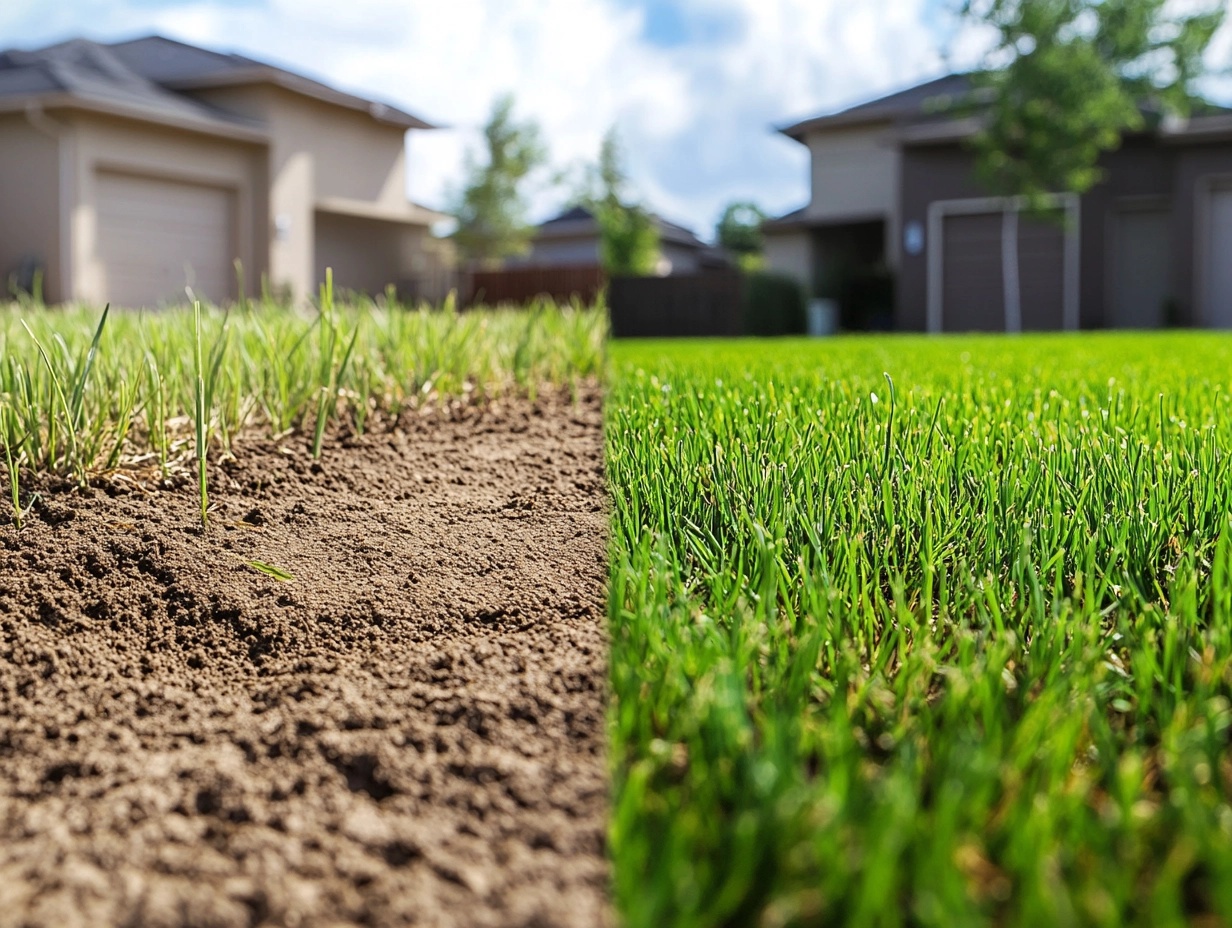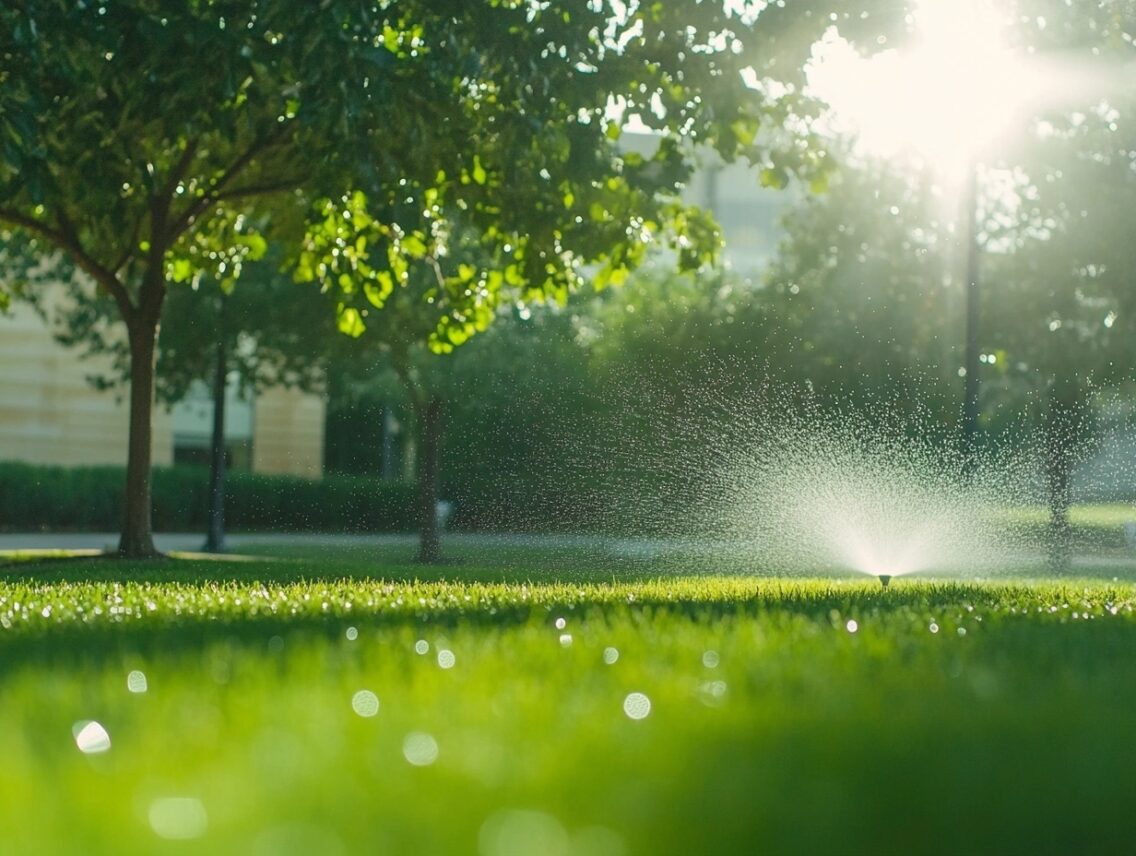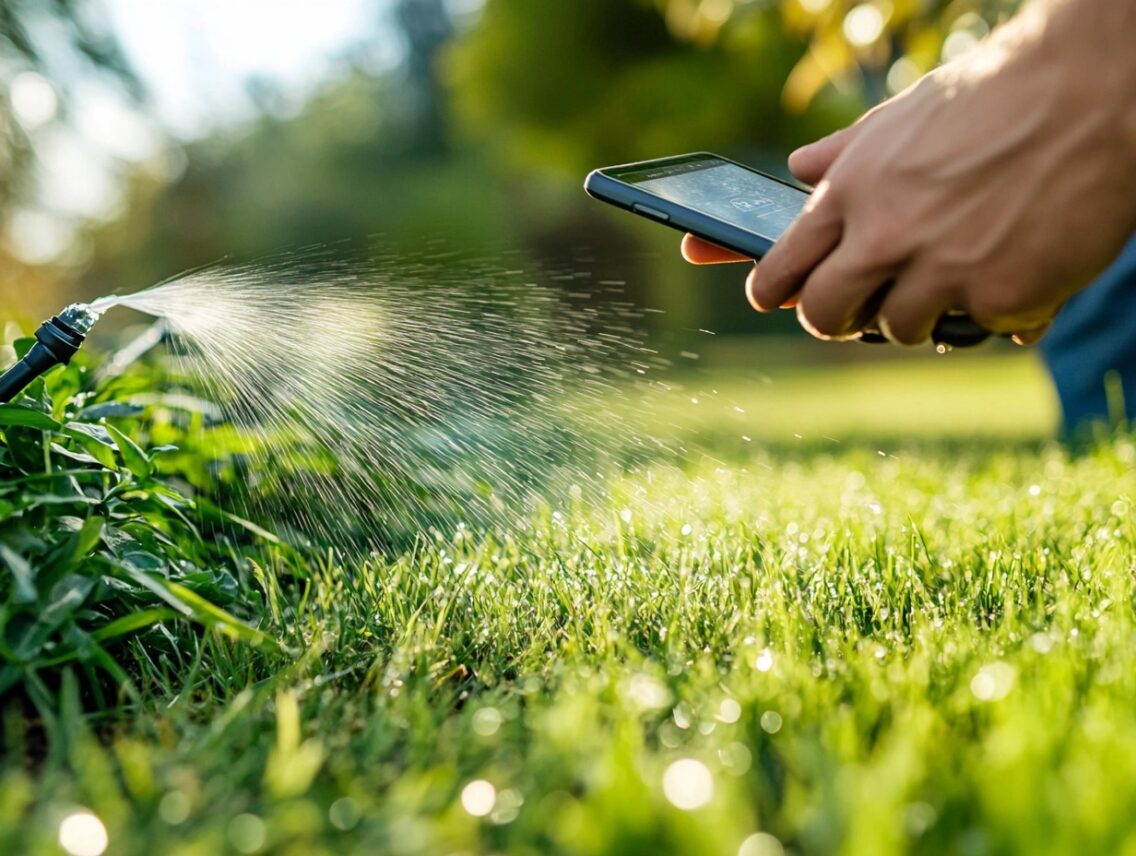Overwatering or Dry Spots? Smart Irrigation System Installations in Chicagoland
Keeping a lawn healthy requires balanced and efficient watering—but many homeowners struggle with overwatering, dry patches, or poor distribution. These issues not only harm grass, plants, and soil but also increase water bills and waste resources.
A professionally installed smart irrigation system ensures even water distribution, reduces waste, and keeps your landscape thriving year-round. At Tommy Pollina Landscape Company, we specialize in smart irrigation solutions that adapt to seasonal weather patterns while maximizing efficiency and sustainability.
Signs Your Lawn Needs a Better Irrigation System
Many homeowners unknowingly damage their lawns with inefficient watering habits. A poor irrigation system can result in wasted water, uneven growth, and unhealthy plants. If you notice any of the following issues, it may be time to upgrade to a smart irrigation system.
1. Uneven Grass Growth & Patchy Areas
✔ Dry spots or thinning grass indicate areas not receiving enough water.
✔ Overwatered patches often look mushy, discolored, or prone to fungal growth.
✔ Sloped areas may dry out faster, requiring adjustments to watering zones.
2. High Water Bills & Inefficient Water Use
A sudden increase in monthly water bills could mean your irrigation system is leaking or overwatering. Traditional sprinklers often waste hundreds of gallons of water, especially if they lack moisture sensors or rain shutoff systems. A smart irrigation system prevents such waste by automatically adjusting watering levels based on weather and soil conditions.
3. Overwatering Leading to Pest & Weed Growth
✔ Mushrooms, mold, and moss thrive in overly wet areas, which could be a sign of excess watering.
✔ Standing water or soggy soil attracts mosquitoes and other pests.
✔ Weeds grow aggressively in overwatered landscapes, competing with grass and plants for nutrients.
4. Your Soil Type Is Affecting Water Absorption
Different soil types absorb and retain water differently, affecting how efficiently your lawn gets watered.
- Clay soil holds water longer, leading to puddling and slow drainage.
- Sandy soil drains too quickly, requiring more frequent watering in smaller amounts.
- Loamy soil absorbs water evenly, making it ideal for most irrigation systems.
If your soil isn’t compatible with your current irrigation system, it might be time to upgrade to a smart irrigation system that adjusts watering based on soil moisture levels.
5. Water Runoff & Erosion Around Your Property
If water pools on driveways, sidewalks, or slopes, it means your irrigation system isn’t directing water efficiently. Runoff not only wastes water but also erodes soil and washes away essential nutrients. A smart irrigation system prevents such damage by controlling water pressure and delivery rates based on landscape conditions.
6. Changing Landscape Over Time
✔ Newly planted trees and shrubs may block water from reaching other plants.
✔ Expanded garden beds or patio installations might disrupt existing sprinkler placement.
✔ Lawn growth and changes in plant size can create shaded areas that require different watering schedules.
If your landscape has evolved, it’s essential to reassess your irrigation system to ensure all plants receive proper water coverage.
The Benefits of a Smart Irrigation System
A water irrigation system spraying water on a lawn
Water Conservation & Cost Savings
A smart system adjusts water usage based on weather and soil conditions, preventing unnecessary watering.
✔ Uses up to 50% less water than traditional sprinklers.
✔ Reduces water bills by preventing overuse.
✔ Eco-friendly irrigation helps conserve local water resources.
Precision Watering for Lawns, Gardens & Landscapes
Modern irrigation systems ensure targeted watering for lawns, gardens, and plant beds, adapting to:
✔ Different plant types—Delivers more water to thirsty plants, less to drought-tolerant species.
✔ Soil conditions—Prevents erosion and nutrient depletion by regulating moisture.
✔ Weather patterns—Sensors adjust schedules based on rainfall and temperature.
With automated irrigation, homeowners enjoy lush, healthy landscapes while cutting down on water waste.
How Smart Irrigation Works
Integration of Sensors, Timers & Automation
A smart irrigation system combines advanced technology for precise watering control.
Key features include:
✔ Weather-Based Controllers—Adjust watering schedules based on real-time weather data.
✔ Soil Moisture Sensors—Detect dryness levels to prevent overwatering.
✔ Automated Timers—Ensure consistent, scheduled irrigation.
How Homeowners Can Monitor Their System Effectively
Even with automation, regular monitoring ensures efficiency and prevents problems.
✔ Use Smart Irrigation Apps—Track real-time water usage and adjust settings remotely.
✔ Check for Overwatering Alerts—Some systems send alerts if excess water is applied.
✔ Sync with Local Weather Data—Prevent unnecessary watering during rainy periods.
Why Hire an Expert for Installation?
While DIY systems exist, a professional irrigation contractor in North Shore, Chicago, IL, ensures:
✔ Proper design & installation for even water coverage.
✔ Efficient zoning to prevent water waste.
✔ Seamless integration with existing landscape features.
Hiring an irrigation contractor guarantees a customized system that meets your yard’s unique needs.
Common Irrigation Issues & How to Fix Them
Even the best irrigation systems require routine maintenance to stay efficient. Identifying minor issues early can help prevent costly repairs and ensure even water distribution throughout your landscape.
1. Leaky Sprinkler Heads & Pipes
Signs of a leak:
✔ Soggy patches or standing water around sprinkler heads.
✔ Unusual spikes in your water bill despite no extra usage.
✔ Low water pressure affects the spray’s strength.
How to fix it:
🔹 Check for loose or cracked fittings—tighten connections or replace damaged parts.
🔹 Look for broken sprinkler heads—remove debris and install a new nozzle if necessary.
🔹 Test for underground leaks—turn off the system and watch for water pooling near pipes. If found, call an irrigation contractor for professional repairs.
2. Clogged Sprinkler Heads
Signs of a clog:
✔ Uneven water distribution—some areas receive too much water, while others remain dry.
✔ Weak spray patterns or misdirected water flow.
✔ Dirt or debris buildup inside the sprinkler head.
How to fix it:
🔹 Turn off the irrigation system and remove the clogged sprinkler head.
🔹 Soak it in water and use a small wire or toothbrush to clean the nozzle.
🔹 Reinstall and test the system to ensure proper spray patterns.
3. Low Water Pressure
Signs of low pressure:
✔ Sprinklers barely spray water or cover a much smaller area than usual.
✔ Some sprinkler heads work fine while others struggle.
✔ It takes longer than usual to water the entire lawn.
How to fix it:
🔹 Check for leaks in pipes or fittings—even small leaks can reduce pressure.
🔹 Ensure valves are fully open—sometimes, partially closed valves limit water flow.
🔹 Remove mineral buildup in sprinkler heads—hard water deposits can clog nozzles.
4. Poor Water Coverage (Uneven Lawn Hydration)
Signs of poor coverage:
✔ Dry spots and overwatered areas in the same lawn.
✔ Water runoff pooling in specific areas.
✔ Some sprinkler heads fail to reach their intended zone.
How to fix it:
🔹 Adjust sprinkler spray patterns—make sure water is evenly distributed.
🔹 Consider upgrading to a smart irrigation system that automatically adapts water pressure and distribution.
🔹 Check for obstructions—shrubs, trees, or structures may block water flow.
Seasonal Irrigation System Maintenance
Each season brings different watering needs—and proper maintenance prevents costly system damage.
Spring Startup & Adjustments
✔ Check for leaks & broken sprinkler heads before restarting.
✔ Test controllers & sensors for accuracy.
✔ Adjust water schedules to match seasonal plant growth.
Winterization: Protecting Pipes & Sprinklers
✔ Shut off the main water supply before the first freeze.
✔ Drain irrigation lines to prevent pipe bursts.
✔ Cover exposed sprinkler heads to avoid cold weather damage.
Proactive Steps to Prevent Costly Repairs
✔ Why Early Spring Inspections Matter: Checking before peak watering season prevents breakdowns.
✔ The Risks of Skipping Winterization: Frozen pipes can burst, leading to costly system replacements.
✔ Best Time for System Upgrades: Upgrading during off-season months (fall/winter) saves money and time.
By scheduling irrigation system services in North Shore, Chicago, IL, homeowners extend the lifespan of their systems while reducing maintenance costs.
Homeowner adjusting an irrigation controller on their phone
Upgrade Your Irrigation for a Healthier Lawn
A well-maintained smart irrigation system eliminates dry spots, prevents overwatering, and reduces water waste, ensuring a lush, thriving landscape year-round. With professional irrigation system services in North Shore, Chicago, IL, homeowners can improve water efficiency, protect their lawns, and extend the lifespan of their irrigation systems. Whether you need a new system installation, routine irrigation maintenance in North Shore, Chicago, IL, or seasonal system checks and winterization, Tommy Pollina Landscape Company provides expert solutions tailored to your landscape’s needs.
📞 Upgrade your irrigation system today—contact us for a consultation!
Latest Posts:
- Illuminate Your Holidays with Professional Decor and Lighting
- Team Fallico & Tommy Pollina Landscaping have partnered to Introduce GLOW
- Overwatering or Drying? Smart Irrigation System Installations
- Hardscaping Solutions for Stronger & Durable Outdoor Spaces
- Boost Your Home Value with an Outdoor Kitchen: 100% Return on Investment!
- Tired of a Patchy Lawn? Let’s Go Over Some Valuable Tips
- No Privacy in Your Yard? Landscape Designs That Add Beauty & Seclusion
- Lou Manfredini from WGN Radio Trusts Tommy Pollina as the Landscaper of the Chicagoland Area
- Year-Round Yard Care: Cleanup, Snow Removal & Tree Care Services
- Mulch is Frequently Used in Landscape Design
- Yard Flooding Issues? A Complete Guide
- Controlling Sump Pump Discharge


